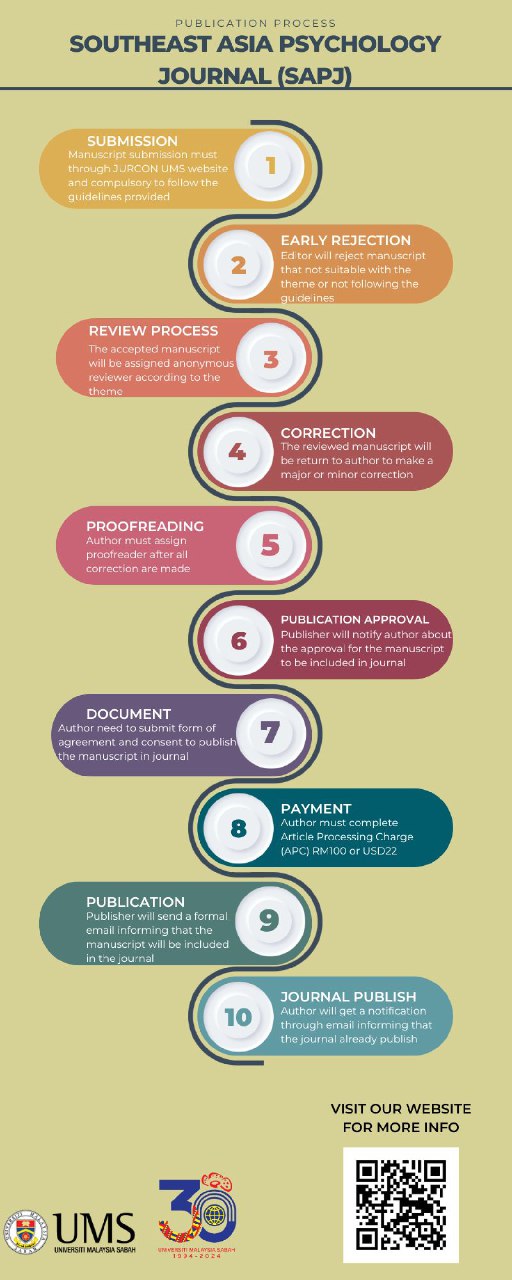Percaya Terhadap Pasangan: Definisi Menurut Pendekatan Interpretative Phenomenological Analysis (IPA)
Keywords:
Percaya, Pasangan, Hubungan, Interpretative Phenomenological Analysis (IPA)Abstract
Konsep percaya merupakan satu istilah yang merujuk kepada perspektif sosio-budaya yang dikaitkan dengan satu konsep perhubungan yang membekalkan keselamatan, harmoni, dan kebajikan terhadap individu, pasangan, ahli keluarga dan komuniti secara keseluruhannya.Tujuan kajian ini adalah untuk mengenal pasti definisi percaya terhadap pasangan yang mana ianya
berfokus kepada perhubungan dalam perkahwinan. Kajian ini melibatkan seramai 17 orang subjek lelaki dan perempuan yang telah berkahwin bagi tempoh kurang daripada 10 tahun. Rekabentuk kajian ini adalah menggunakan metod Interpretative Phenomenological Analysis (IPA) yang membolehkan penyelidik untuk mengkaji pengalaman sebenar subjek kajian berkaitan
isu yang dikaji. Penyelidik telah menjalankan sesi temubual secara mendalam kepada semua subjek kajian bagi mendapatkan data. Analisis data dijalankan mengikut metod IPA daripada Smith, Flowers, & Larkin (2010). Keputusan kajian telah menghasilkan lima (5) tema berkaitan dengan definisi percaya terhadap pasangan dalam perhubungan iaitu 1) Kebebasan, 2) Keyakinan, 3) Harapan 4) Komunikasi dan 5) Ikatan Sosial. Limitasi kajian serta cadangan untuk kajian akan datang turut dinyatakan.
References
Boszormenyi-Nagy, I., & Krasner, B. R. (1986). Between give and take: A clinical guide to contextual therapy. NY: Brunner/Mazel
Bowlby, J. (1969). Attachment and loss: Vol. 1. Attachment. New York: Basic Book.
Campbell, L., Simpson, J. A., Boldry, J. G., & Rubin, H. (2010). Trust, variability in relationship evaluations and relationship processes. Journalof Personality and Social Psychology, 99, 14–31.
Cobb, N. P., Larson, J. H., & Watson, W. L. (2003). Development of the attitudes about romance and mate selection scale. Family Relations: Interdisciplinary Journal of Applied FamilyStudies, 52, 222-231.
Creswell, J.W. (2007). Qualitative inquiry and research design: Choosing among five approaches (2nd ed.). Thousand Oaks, CA: Sage.
Cook, K. S. (2001).Trust in society. Volume2. The Russell Sage Foundation
Deutsch, M. (1973).The resolution of conflict: Constructive and destructive processes. New Haven, CT: Yale University Press.
Erikson, E. H. (Ed.). (1963). Youth: Change and challenge. Basic books.
Frost, T., Stimpson, D. V., & Maughan, M. C. (1978). Some correlates of trust. Journal of Psychology, 99(1), 103.
Fukuyama, F. (1996). Trust: The social virtues and the creation. Free Press.
Holmes, J. G. (1991). Trust and the appraisal process in close relationships. In W. H. Jones, &
D. Perlman (Eds), Advances in personal relationships: A Research Annual Vol. 2 (pp. 57104). London: Jessica Kingsley Publishers.
Holmes, J. G., & Rempel, J. K. (1989). Trust in close relationships. In C. Hendrick (Ed.), Review of personality and social psychology: Close relationships (Vol. 10, pp. 187–220). Newbury Park, CA: Sage.
Hosmer, T. (1995). Trust: The connecting link between organizational theory and philosophical ethics.The Academy of Management.
Johnson, S.M., & Talitman, E. (1997). Predictors of success in emotionally focused marital therapy.Journal of Marital Family Therapy, 23(2):135-52.
Keyton, J., & Smith, F. L. (2009). Distrust in leaders: Dimensions, patterns, and emotional intensity. Journal of Leadership & Organizational Studies, 16(1), 6-18.
Larzelere, R. E., & Huston, T. L. (1980). The dyadic trust scale: Toward understanding interpersonal trust in close relationship. Journal of marriage and the family, 42, 595-604.
Lewicki, R. J., & Bunker, B. B. (1995). Trust in relationships: A model of development and decline. In J. Z. Rubin (Ed.) Conflict, cooperation, and justice: Essays inspired by the work of Morton Deutsch. San Francisco: Jossey-Bass.
McKnight, D. H., Cummings, L. L., & Chervany, N. L. (1998). Initial trust formation in new organizational relationships. Academy of Management Review, 23 (3), 473-490.
Murray, S. L., Pinkus, R. T., Holmes, J. G., Harris, B., Gomillion, S., Aloni, M., et al. (2011). Signaling when (and when not) to be cautious and self-protective: Impulsive and reflective trust in close relationships. Journal of Personality and Social Psychology 101(3), 485-502.
Rempel, J. K., Holmes, J. G., & Zanna, M. P. (1985). Trust in close relationships. Journal of Personality & Social Psychology, 49: 95-112.
Rempel, J. K., Ross, M., & Holmes, J. G. (2001). Trust and communicated attributions in close relationships. Journal of Personality and Social Psychology, 81, 57-64.
Rotter, J. B. (1967). A new scale for the measurement of interpersonal trust. Journal of Personality, 35, 651-665.




